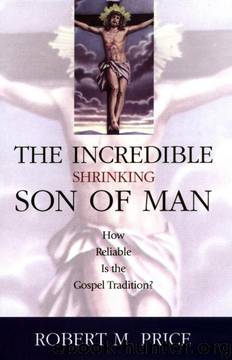Incredible Shrinking Son of Man: How Reliable Is the Gospel Tradition? by Robert M. Price

Author:Robert M. Price
Language: eng
Format: mobi, epub
Published: 2009-07-07T05:19:00+00:00
Luke 7:41-43 constitute a miniature parable (the Two Debtors) tucked into the heavily redacted Lukan version of the anointing. Luke has made the original into another lesson of the superior regard God has for repentant sinners over the lifelong righteous. As John Drury surmises,20 the parable was no doubt written by Luke himself for this context, even though his various other additions to the story contradict it. The parable itself betrays significant Lukan special vocabulary, and it fits his characteristic theme of the rejoicing of, or over, sinners who repent. This one does not come out of debates over Gentile "sinners" being converted to Christianity, as some texts discussed in the previous section do. It is simply a narrative embellishment helping to portray Jesus, as Luke wanted to do, as a champion of repentant sinners against those who (for what reason he leaves unclear, having no doubt forgotten the original point of such texts in the Gentile Mission debate) would begrudge them their repentance.
Pretty much the same lesson is inculcated in another Lukan creation, the parable of the Publican and the Sinner (Luke 18:9-14). Given the fact that Luke has organized his gospel's central section around the Book of Deuteronomy,21 so as to provide a kind of "Deutero-Deuteronomy" for his readers (recalling Matthew's new Christian Pentateuch, comprising his five great discourses), the sequential position of the parable matches that of Deut. 26:13-15, the prescribed prayer for the annual rendering of agricultural tithes: "Then you shall say before Yahve your God, `I have removed the sacred portion out of my house, and moreover I have given it to the Levite, the sojourner, the fatherless, and the widow, according to all the provisions of your commandment which you have commanded me; I have not transgressed any of your commandments, neither have I forgotten them; I have not eaten of the tithe while I was mourning, or removed any of it while I was unclean, or sacrificed any of it to the dead; I have obeyed the voice of Yahve my God, I have done according to all that you have commanded me. Look down from your holy habitation, from heaven, and bless your people Israel and the ground which you have given us, as you swore to our fathers, a land flowing with milk and honey."
There is nothing particularly self-righteous or chest-thumping about this confession of obedience. The point is exactly the same as the temple entrance liturgies of Psalms 15 and 24, which list the moral requirements of any and all who would seek Yahve there, a kind of "security system" to weed out the hypocrites excoriated by Isaiah (1:12-17): "If you haven't kept these, then don't bother showing up." Doesn't Luke see this? He levels a cruel spoof at the prayer, as if it were the self-worship of a pious windbag. One wonders if there is another agenda here, namely, if Luke is sweeping away the piety of Jews at the time of the Jewish War with Rome: "this people .
Download
Incredible Shrinking Son of Man: How Reliable Is the Gospel Tradition? by Robert M. Price.epub
This site does not store any files on its server. We only index and link to content provided by other sites. Please contact the content providers to delete copyright contents if any and email us, we'll remove relevant links or contents immediately.
| Buddhism | Christianity |
| Ethnic & Tribal | General |
| Hinduism | Islam |
| Judaism | New Age, Mythology & Occult |
| Religion, Politics & State |
Cecilia; Or, Memoirs of an Heiress — Volume 1 by Fanny Burney(32547)
Cecilia; Or, Memoirs of an Heiress — Volume 2 by Fanny Burney(31945)
Cecilia; Or, Memoirs of an Heiress — Volume 3 by Fanny Burney(31931)
The Secret History by Donna Tartt(19053)
Sapiens: A Brief History of Humankind by Yuval Noah Harari(14368)
Leonardo da Vinci by Walter Isaacson(13316)
The Radium Girls by Kate Moore(12018)
Sapiens by Yuval Noah Harari(5366)
How Democracies Die by Steven Levitsky & Daniel Ziblatt(5215)
The Wind in My Hair by Masih Alinejad(5092)
Homo Deus: A Brief History of Tomorrow by Yuval Noah Harari(4908)
Endurance: Shackleton's Incredible Voyage by Alfred Lansing(4769)
Man's Search for Meaning by Viktor Frankl(4583)
The Silk Roads by Peter Frankopan(4526)
Millionaire: The Philanderer, Gambler, and Duelist Who Invented Modern Finance by Janet Gleeson(4465)
The Rape of Nanking by Iris Chang(4203)
Joan of Arc by Mary Gordon(4101)
The Motorcycle Diaries by Ernesto Che Guevara(4089)
Stalin by Stephen Kotkin(3957)
